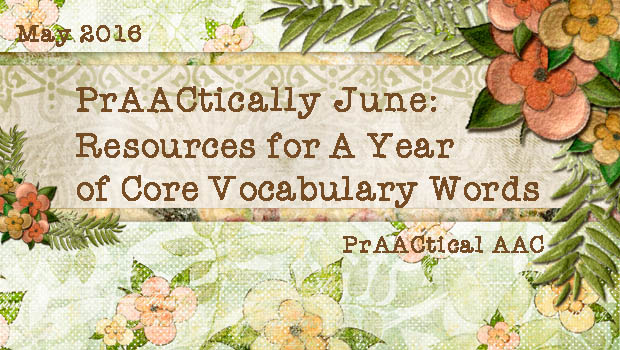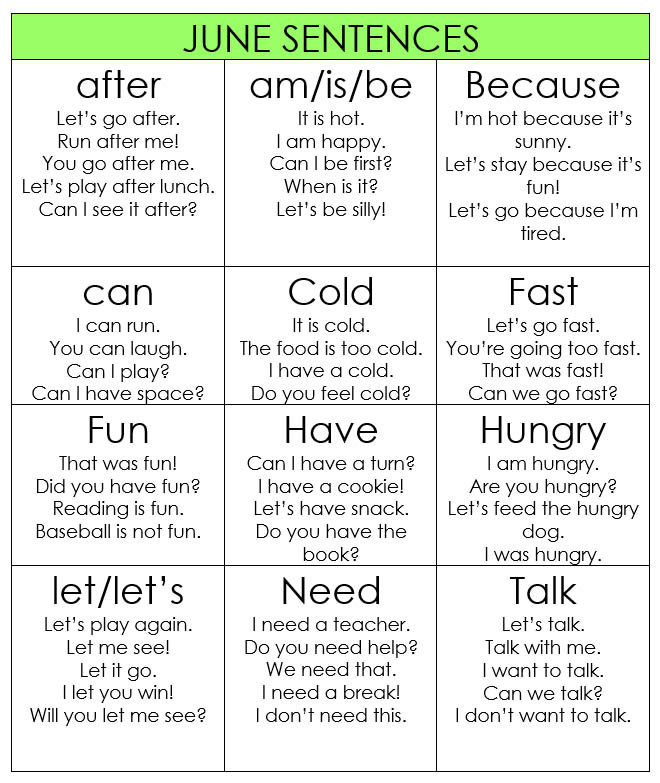PrAACtically June: Resources for A Year of Core Vocabulary Words

We’re ready to tear off another page of the calendar and that means we are preparing for a new set of core words to focus on. Join us in highlighting a set of core words for the month and helping our AAC learners become more fluent in using them on a day-to-day basis, Whether you are following along with the 2013 Year of Core (Set 1-12 words/month) or the 2014 A(nother) Year of Core: (Set 2-16 words/month; Different than the previous year’s core words), or just getting started, here are some helpful resources.
Our June words are listed below.
Set 1 (2013) List: after, am/be/is, because, can, cold, fast, fun, have, hungry, let, need, talk
Set 2 (2014) List: about, back, buy, grandmother, hand, inside, lose, move, okay, people, quiet, short, show, two, water, yellow
- Templates for you to plug in your own symbols: Set 1 words, Set 2 words
- Minspeak/Unity version: Set 1 words
- PCS versions: Set 1 words, Set 2 words
- Symbol Stix version: Set 1 Words
- Lesson Pix: Set 1 Words
- WordPower: Set 1 Words (Note that this contains all the files for several versions of WordPower for both SymbolStix and PCS)
We can teach and model these individually, and also in sentences. Tim DeLuca shares some ideas to get us started (download here).

Reading is such a great way to build experiences with core vocabulary. Here are some book suggestions if you are looking for ways to incorporate core word practice into your storybook reading with AAC learners.
- And If the Moon Could Talk by Kate Banks: after, am/be/is, can, talk
- I Have a Cold by Grace Maccarone: because, can, cold, have, hungry, let, need
- More Spaghetti, I Say! By Rita Golden Gelman: after, am/be/is, can, cold,fun, have, hungry, talk
- My Crayons Talk by Patricia Hubbard: can, fun, have, talk
- Nobody’s Cats: How One Little Kitty Came In From the Cold by Valerie Ingram and Alastair Schroff: can, cold, fast, have, hungry, let, need, talk
- The Little Mouse, the Red Ripe Strawberry, and the Big Hungry Bear by Don Wood: after, am/is/be, because, have, hungry, need
- Those Shoes by Maribeth Boelts: because, can, fast, have, need
- Waiting is Not Easy by Mo Willems: am/be/is, can, have, let, talk
- What Do Teachers Do After You Leave School? by Anne Bowen: after, because, can, fun, have, need, talk
Looking for more ideas? Check out the calendar Rachael Langley shared with us last year for these words (2015 June Calendar of Core Word Ideas).
We appreciate the support of Tim DeLuca, Lisa Timm, Nancy Inman, Alison Wade, Eric Sailers, Russell Cross, Gail Van Tatenhove, Bill Binko, Rachael Langley, and all the others who created these resources and allowed us to share them.
Filed under: Featured Posts, PrAACtical Thinking
This post was written by Carole Zangari

2 Comments
I MUST SAY THAT ALL I RECEIVE FROM YOU IS VERY IMPORTANT FOR LEARNING MORE AND MORE. THANK YOU VERY MUCH
I have been meaning to ask this for a while – whenever I see lists of core vocabulary for a month, I notice that opposites are never in the same month (e.g. COLD is on this month’s list but not HOT, FAST but not SLOW, etc.) I understand that we wouldn’t want students to confuse the words so spacing the months in which we introduce/focus on each word creates more of a separate concept for each, but does it matter at what communication level the student is? For instance, I feel like my students wouldn’t understand the concept of FAST without simultaneously learning the concept of SLOW. Has that shown not to be the case?